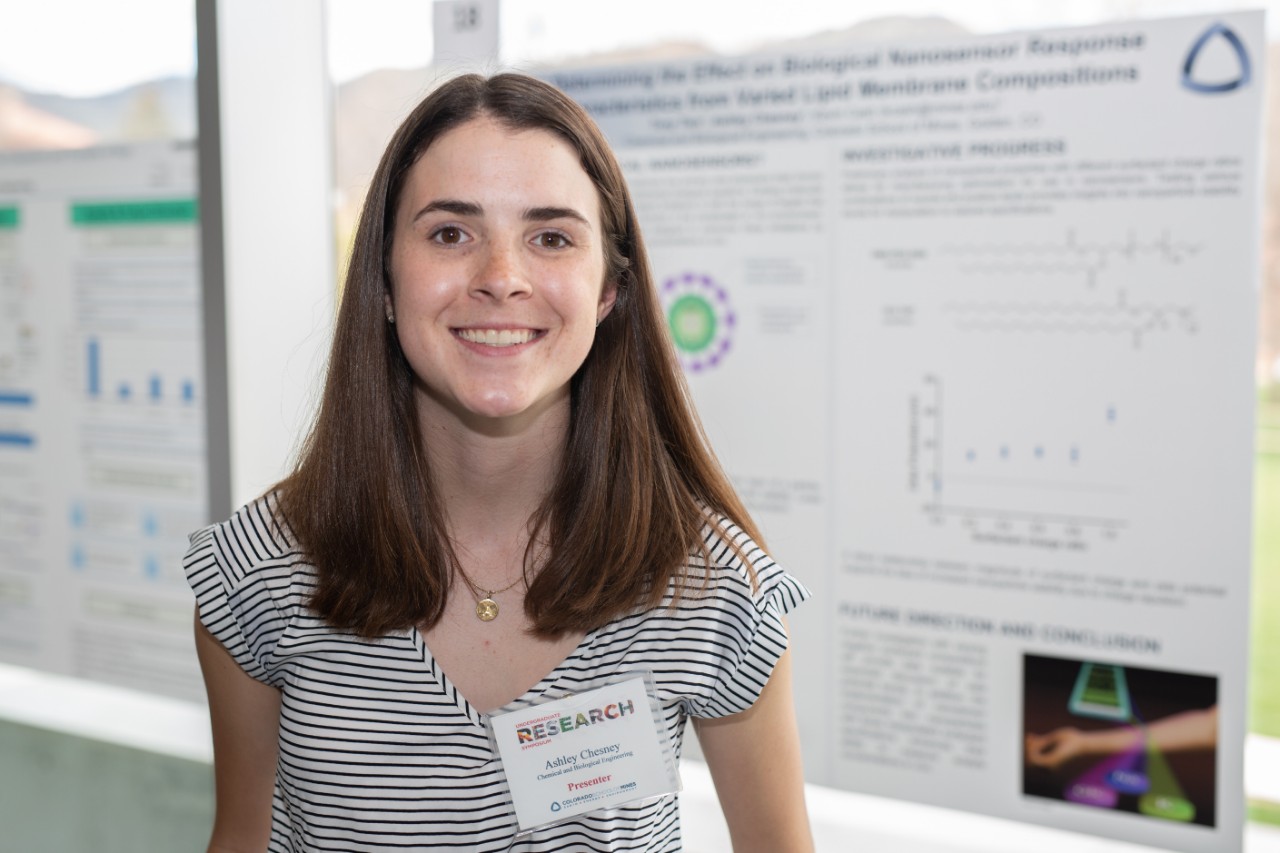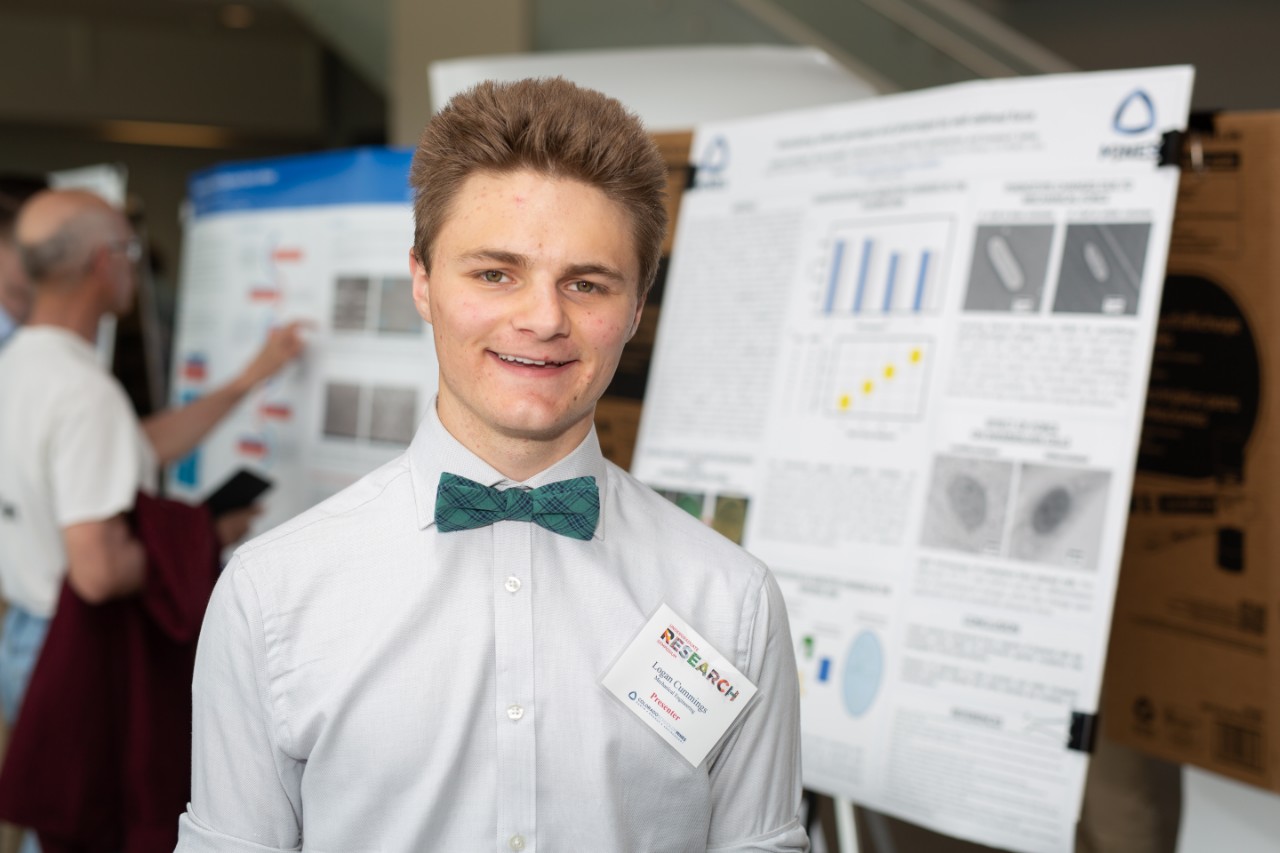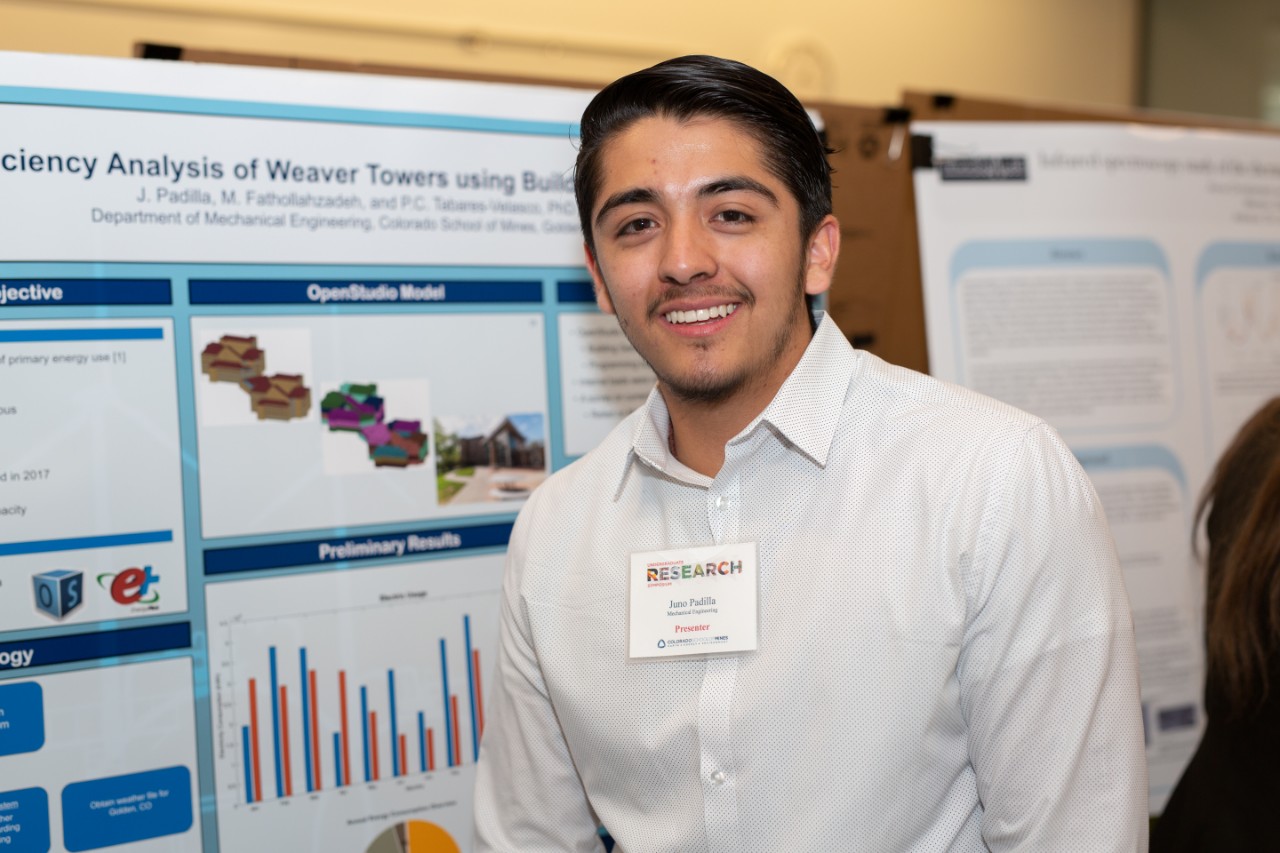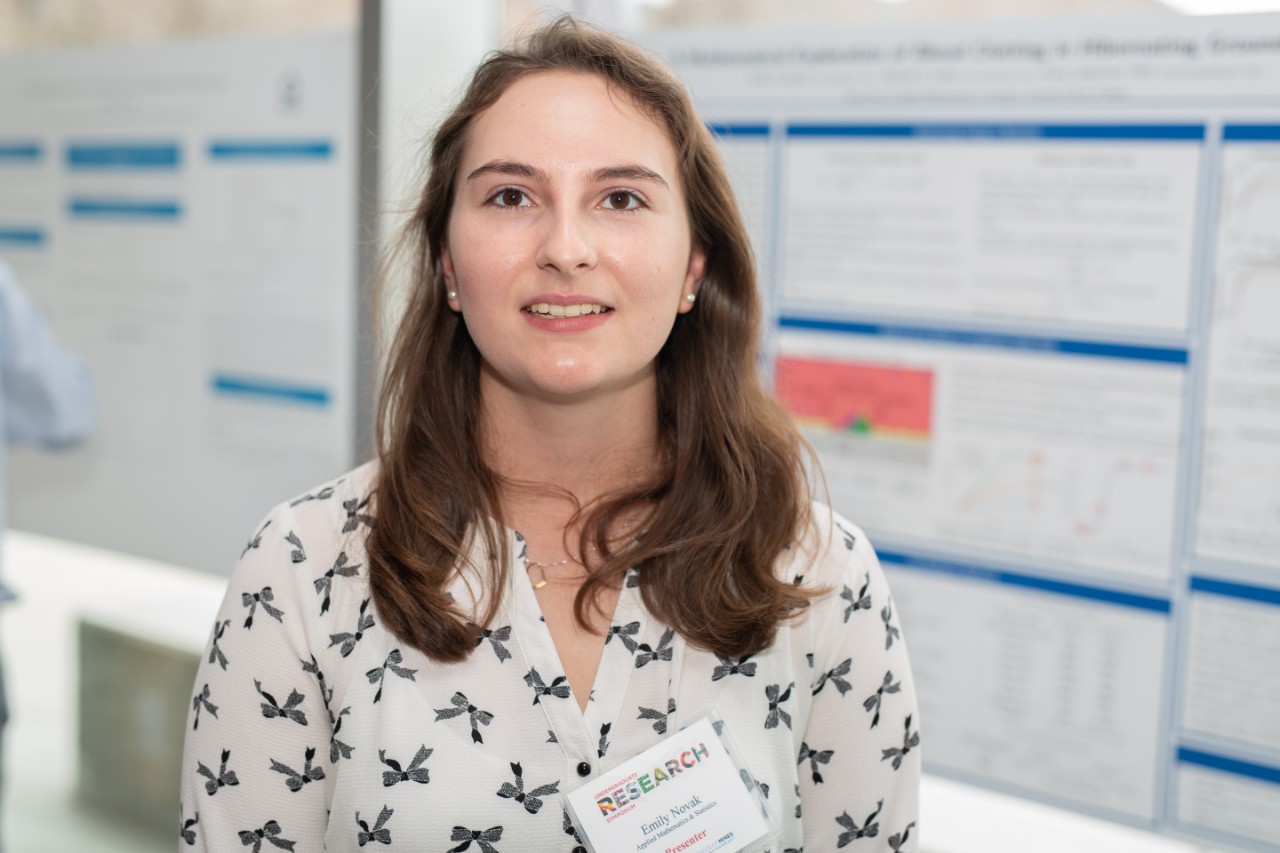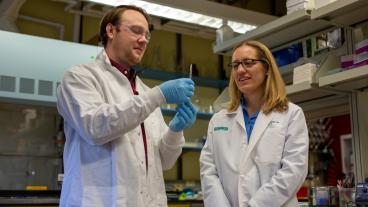Undergrads share innovative research work at symposium
Colorado School of Mines hosted its second annual Undergraduate Research Symposium on April 26, highlighting the work of 125 freshmen, sophomores, juniors and seniors.
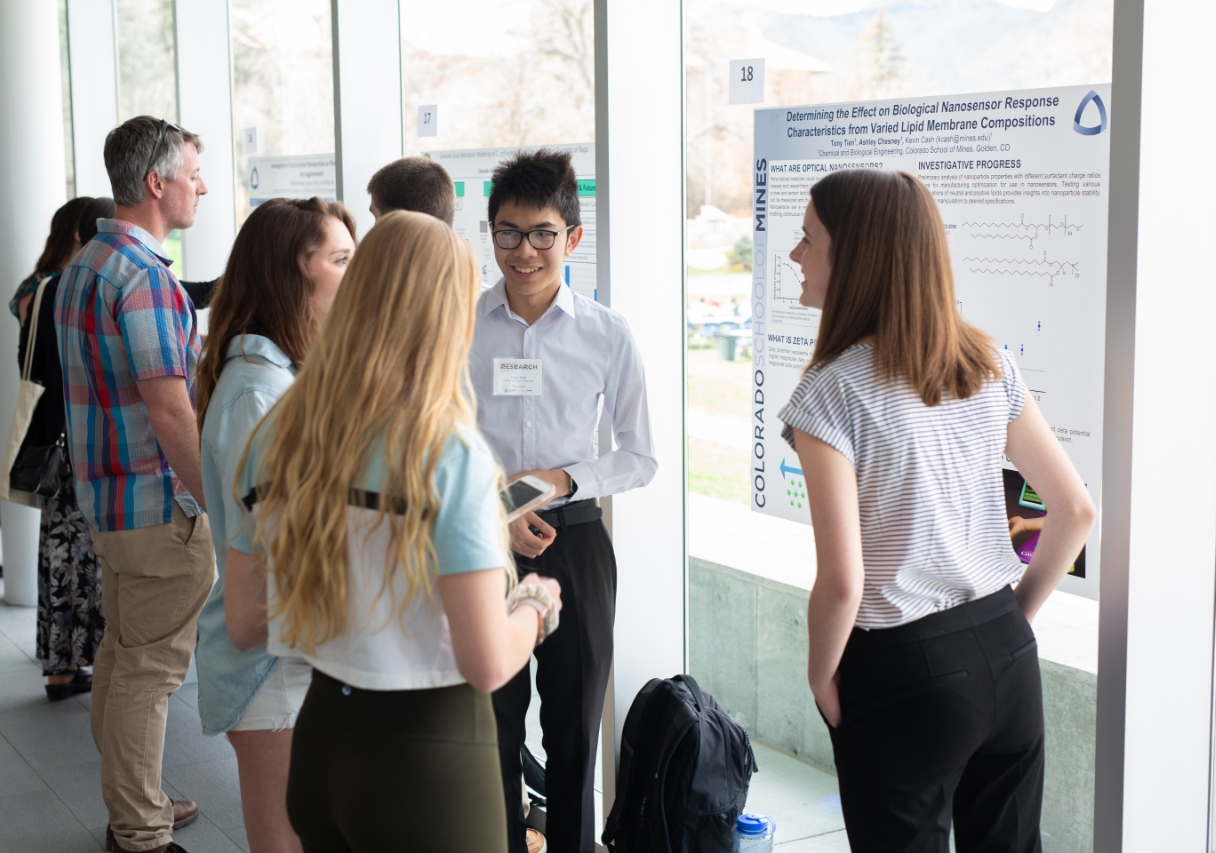
Sponsoring this year's symposium was CoorsTek, also the namesake of the CoorsTek Center for Applied Science and Engineering, where the year-end event was held.
Here is a snapshot of some of the diverse research being conducted by Mines undergraduates across the university's many disciplines:
Ashley Chesney
Freshman majoring in chemical and biological engineering, conducting research with Chemical and Biological Engineering Assistant Professor Kevin Cash
What's the focus of your research? "The focus of our research is working on nanosensor technology and, specifically for our project, we're involving different lipid compositions that we use for our nanosensors and basically how the Zeta potential between those compositions affects the fluorescence intensity."
Why should Mines students consider doing undergraduate research? "Personally, I've learned a ton about the problem-solving process and especially being able to analyze data or when things go wrong, looking at it and going through all the points to try to figure out what possibly could be going wrong or how we could fix it."
Logan Cummings
Freshman majoring in mechanical engineering, conducting research with Physics Assistant Professor Susanta Sarkar
What's the focus of your research? "We've been studying the effects of sonication on both mammalian and bacterial cells. A sonicator is a machine that subjects cells to mechanical force through sound waves. These sound waves are pretty strong so they should be killing everything, but some of the cells have been mutating to survive. So, we've been looking into these mutations to see why they're occurring and how we can use them to study evolution."
Why should Mines students consider doing undergraduate research? "Research is an incredible opportunity to use some of the things you learn in the classroom in a much more applied way. It just encourages a scientific frame of mind that's really useful -- it doesn't matter if you're an engineer or a biologist or a kindergarten teacher, everyone can use a scientific mindset and scientific thinking to work on what they're passionate about."
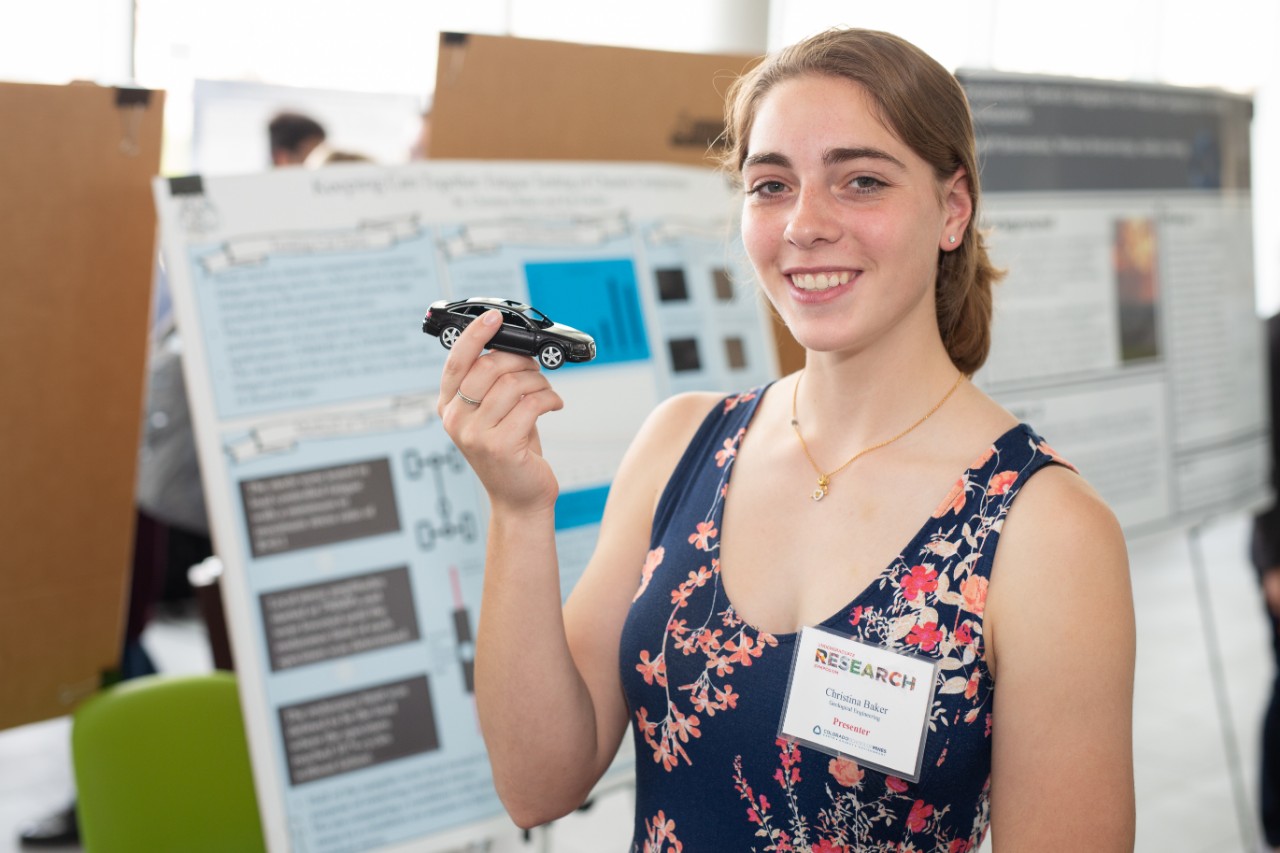 Christina Baker
Christina Baker
Sophomore majoring in geology and geological engineering, conducting research with Metallurgical and Materials Engineering Professor Kip Findley
What's the focus of your research? "We're testing the fatigue life of different steels for chassis components for cars. We have two different samples with the same strength, different microstructures, and then we tensile test them and figure out their endurance limit, or when they don't break. We test the hardness and see what factors for the metals affect the fatigue life, like crack initiation spots, residual stress. Chassis components are in every single car. Knowing the fatigue life of the metals that are used can really affect how cars are manufactured. It can make them last longer. It can make them more durable."
Why should Mines students consider doing undergraduate research? "This is a really great opportunity -- not only do you get to do the actual research but you have to work with clients, you have to work with other people, you get to learn how to use different machines and then here (at the symposium) you get to learn how to present, which is a skill I've struggled with in the past. It's just a great experience to be able to learn new information, work with different people and then present everything you've worked so hard on at the end of the year."
Juno Padilla
Junior majoring in mechanical engineering, conducting research with Mechanical Engineering Assistant Professor Paulo Tabares-Velasco
What's the focus of your research? "In my research, I've been looking at a whole-building energy analysis of Weaver Towers. Out of all the energy consumed in the United States, 40 percent of that is actually due to buildings, both residential and commercial. One way that engineers and researchers alike are trying to tackle this problem is through whole-building energy simulations. I personally am part of a large initiative here on campus where we're trying to model all the buildings on campus and get a good idea of how energy is being consumed so we can try to find ways to optimize it."
Why should Mines students consider doing undergraduate research? "I'd like to thank MURF -- the Mines Undergraduate Research Fellowship -- and the Multicultural Engineering Program for providing me this opportunity to be an undergraduate researcher. Before this, I was at Coldstone scooping ice cream. I wasn't really getting a hands-on experience. You can go to class, you can learn all these equations, you can learn how things are being done throughout the world, but without getting your hands on actual projects, it's hard to get a feel for what you're going to be doing as an engineer."
Emily Novak
Senior majoring in applied mathematics and statistics, conducting research with Applied Mathematics and Statistics Assistant Professor Karin Leiderman
What's the focus of your research? "When ground squirrels hibernate, their blood doesn't clot and we wanted to know why that happens. The velocity of their blood actually slows down -- it's moving so slowly you think it should clot but it doesn't. There are few different things we looked at -- when they're hibernating, their internal temperature decreases, the flow of their blood decreases, the certain production of platelets decreases and also their heart rate drops.
Why should Mines students consider doing undergraduate research? "I want to go to graduate school and you hear that some people go in for their PhDs and realize they hate research. I didn't want that to be me. I did an REU (Research Experience for Undergraduates) a few summers ago and I've always liked final projects in classes, so I thought it would be something good to try. It's just a really good experience."
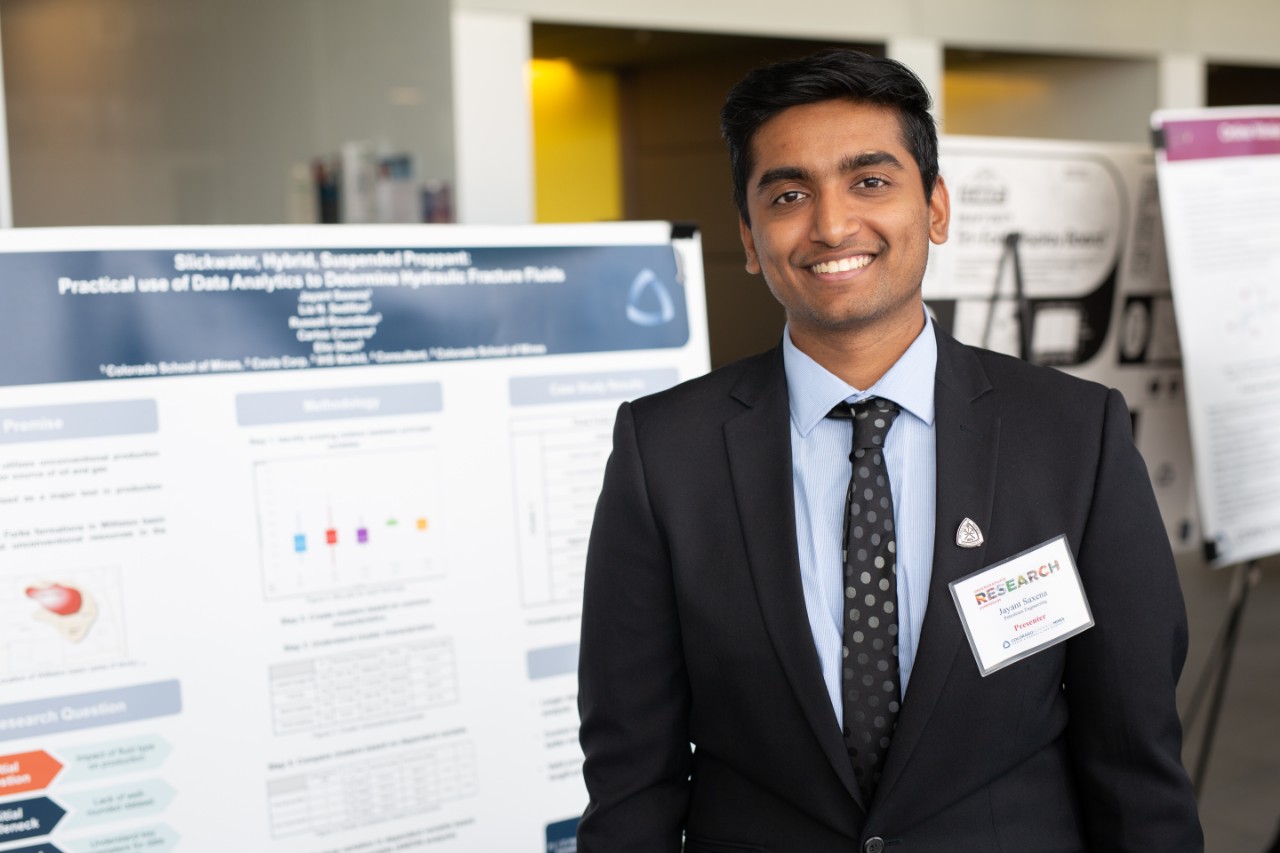 Jayant Saxena
Jayant Saxena
Senior majoring in petroleum engineering, conducting research with Petroleum Engineering Teaching Associate Professor Elio Dean
What's the focus of your research? "I am working with petroleum production data and trying to analyze the impact of fracking fluid types on the production... Data analysis has become such a big thing in petroleum engineering right now and the world in general. We realized that there needs to be a little bit of education on the methodology behind the data analytics to actually understand the statistics, the mathematics that goes behind it. But that often goes overlooked. We started out with a case study and decided to refocus it into a methods approach of data analytics for anyone who is starting out as a data analyst or just looking at a data set and asking, 'What do I do from here?'"
Why should Mines students consider doing undergraduate research? "I've engineered a way from a very traditional engineering role into a much more analytical role - that's all thanks to research. Two years ago, when I started doing this research, I was saying, 'Hey, I'm going to be a hardcore petroleum engineer working in the field.' But I worked in data analysis and found an easy fit with my skills, with my knowledge and with my likes and dislikes. I found a career alternative I never thought of."
Winners of the 2019 Undergraduate Research Symposium poster awards were:
First Prize
Gabriel Adriano, Junior, Chemical and Biological Engineering
Mentor: Dylan Domaille, Chemistry
"Oxidatively Remodeled Hydrogels for Biomedical Applications"
Second Prize
Jesus Mendoza, Senior, Metallurgical & Materials Engineering
Mentor: Jeffrey King, Metallurgical & Materials Engineering
"Development of a 3-D Printed Radiation Shielding"
Zachary Parrott, Junior, Engineering Physics
Mentor: Meenakshi Singh, Physics
"Simulation of Thermal Conduction in a Superconducting Nanowire System"
Third Prize
Jake Stogdill and Jacob Woods, Juniors, Civil Engineering
Mentor: Shiling Pei, Civil & Environmental Engineering
"Moisture Performance of Mass Timber Building in Colorado Climate"
Sarah Jones, Junior, Engineering Physics
Mentor: Serena Eley, Physics
"Vortex Dynamics in Superconductors at High Vortex Densities"
Megan Freytag, Senior, Environmental Engineering
Mentor: Rudy Maltos, Civil and Environmental Engineering
"Enhancing Floc Settleability of Activated Sludge"
CONTACT
Emilie Rusch, Public Information Specialist, Communications and Marketing | 303-273-3361 | erusch@mines.edu
Mark Ramirez, Managing Editor, Communications and Marketing | 303-273-3088 | ramirez@mines.edu

